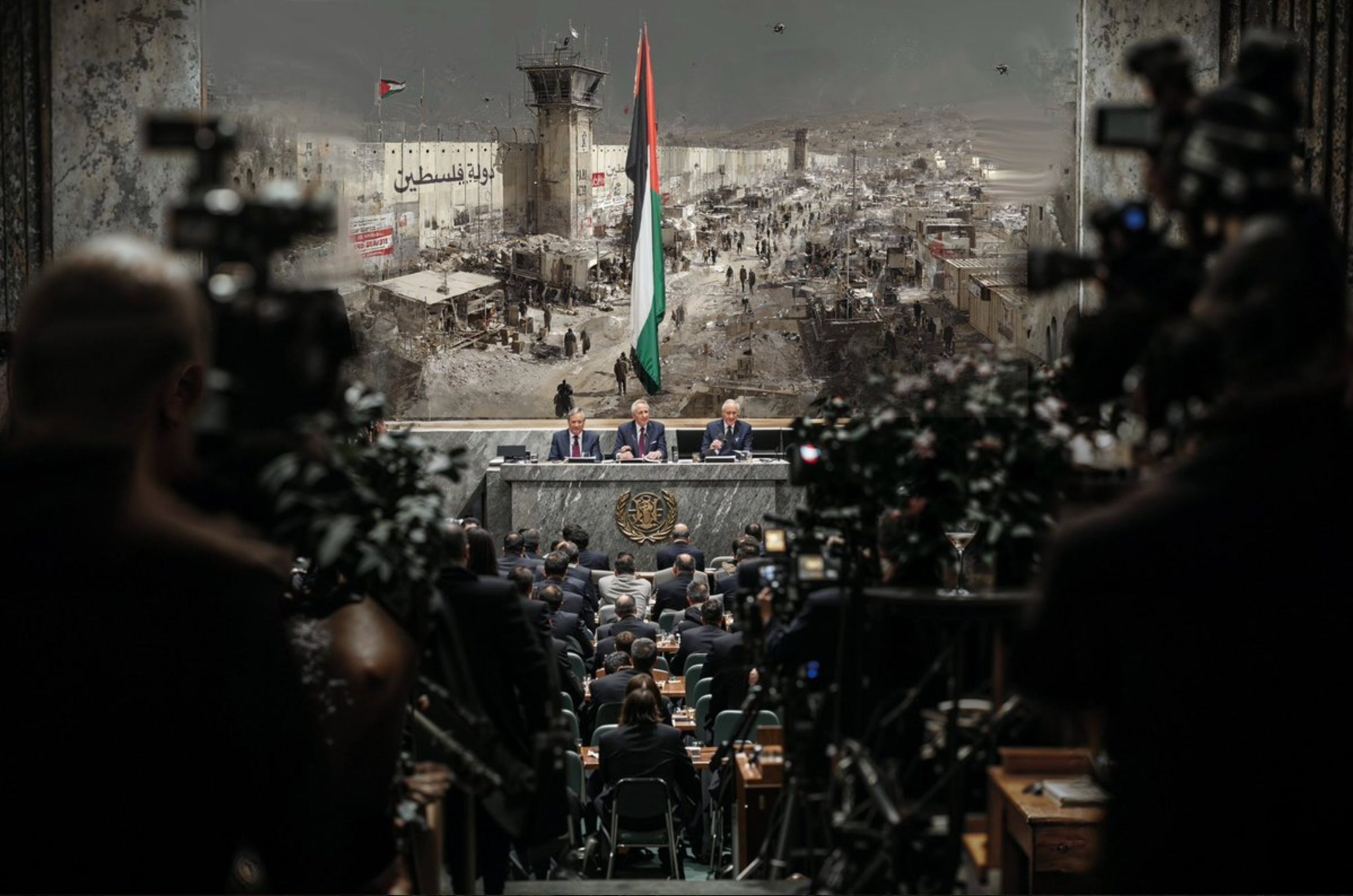Why Palestinian 'Statehood' Is a Sham
A pseudo-state for a permanent Nakba
Several Western countries—including France, the UK, Canada, and Australia—plan to recognize a Palestinian state at the UN General Assembly in the coming days. While this is being celebrated as a breakthrough for Palestinian rights and a step toward justice, what is less examined are the conditions attached to this recognition: territorial demilitarization, governance reforms, and guarantees for Israel's security.
Western diplomatic endorsement offers Palestine the form of statehood while denying its substance, reducing it to a reservation where the colonized surrender liberation for the right to administer their own subjugation.
Demilitarization ensures Israel faces no resistance: Palestinians get a paper state stripped of defense, deemed "viable" only if it secures the very colonial order that dispossessed them. At the same time, colonial governance reforms install a Palestinian ruling class—disciplined, donor-dependent, and willing to enforce the occupation on Israel's behalf. In both, what is sacred is the colonizer's security, and what is forbidden is the colonized's right to defend themselves.
Most revealing of these conditions is France's omission of the Palestinian right of return. This exclusion stems from demographic reality: Jews were never a majority in historic Palestine. Even today, Palestinians remain the majority between the river and the sea, with just as many living in forced exile. A Palestinian state defined by Israeli security cannot allow millions of refugees to come home. Their return would present a "demographic threat" to the state and would decisively strip Israel of its claim to be both Jewish and democratic. Recognition therefore excludes return, making "statehood" not a remedy but the permanent formalization of the Nakba.
Taken together, these conditions construct a colonial protectorate designed to contain the Palestinian struggle for liberation while serving colonial interests. Palestinians would control neither borders, currency, nor resources. No real economy could develop—only aid dependency and engineered underdevelopment.
Self-determination would be reduced to population control and administrative management while decisive power remains with Israel. Palestinian society would be managed through security coordination, denied prosperity and the right to shape its own future. Sustaining such a protectorate requires local intermediaries, and the Palestinian Authority provides the model: a collaborator regime installed to give the illusion of self-governance while legitimizing occupation.
Such arrangements embody the containment approach to colonial control, but this is only one design. While Europe tries to co-opt demands for liberation through managed partition, America backs Israel's annexationist drive to expand settlements and forcibly expel Palestinians. Edward Said captured this settler-colonial logic: "Put them in reservations or just exterminate them."
Europe is moving to fix Israeli sovereignty at the 1967 borders, offering Palestinians a demilitarized pseudo-state on the remaining 22% of historic Palestine. This follows the liberal Zionist formula: a dependent reservation, aid-managed and controlled through security coordination. The goal is securing the spoils of 1948 while placating European publics outraged by the genocide in Gaza.
For Israel's right, even European containment proves inadequate. Settler-colonial logic demands not only territorial domination but the complete removal of Palestinians from all of historic Palestine. The U.S. sustains this drive, backing annexationist designs that demand total territorial and demographic control. Washington bankrolls and shields expansion and expulsion, while America's Christian right sanctifies ethnic cleansing as a biblical precondition for the Second Coming of Christ.
To advance this project, Israel has accelerated settlement construction in the West Bank to render the 1967 borders futile before any symbolic Palestinian state can take shape, treating Europe's "managed decolonization" as an obstacle rather than a solution. But Israel's furious annexations—its rush to seize more land—are not a display of strength but of panic, the reflex of a colonial project that senses its impunity slipping.
This frantic response—including threats to punish states that recognize Palestine—shows that Israel and the U.S. are aligned against Europe, effectively splitting the West. Palestinians can exploit this dynamic, but understanding why this is such a polarizing issue requires examining what Palestinian statehood means to each side's agenda. This analysis reveals that statehood under these conditions is a fiction—a fiction that carries two truths at once.
On the one hand, recognition is a trap because a Palestinian state on the 1967 borders cements the loss of everything stolen in 1948, abandoning the right to justice for the Nakba. A state on these terms forfeits the right of return, consigns Palestine to dependence, and reduces liberation to administrative management under Israeli supremacy.
On the other hand, recognition is also a step forward. For decades, the U.S. and Israel have dictated that Palestine does not exist politically—only a "disputed territory" with no right to statehood. Granting political status, even with conditions, breaks that frame. It affirms Palestine as a state with rights under international law: territorial integrity, treaty membership, and recourse to international courts. It strengthens Palestinian cases by defining them as state-to-state violations rather than "internal disputes," and it gives endorsing states grounds to treat Israel as an occupier of another sovereign state—the legal and moral basis for sanctions.
Coming from close Western allies, this acknowledgment signals that Israel is losing the narrative in the very capitals it depends on. Israel and the U.S. fight it so fiercely because they know even symbolic statehood, however compromised, builds momentum and chips away at Israel's global legitimacy. It undermines their regime of perpetual occupation. This shift in global discourse is not liberation, but it's not meaningless.
It matters because Zionism thrives on global legitimacy. When Western allies begin to challenge Israel's absolute impunity, its moral cover thins. The significance lies not in the illusion of statehood on the ground but in the fractures recognition exposes in the international order: between Europe and the U.S., between law and power, between Israel's image and its colonial reality.
This brings us to the U.S. veto paradox. The colonial containment formula Europe is advancing is intended to be Israel's escape route from accountability for the genocide in Gaza, a device that rewards mass killing with the fabrication of a pseudo-state. But Europe's plan requires UN backing to deliver the complete formula. Yet the U.S. veto is automatic, the last line of defense for Israel. By blocking Palestine's UN membership, the veto prevents Europe from implementing the complete containment strategy while failing to stop bilateral recognition.
The veto can deny Palestine a seat at the UN, but it cannot prevent states from recognizing it and treating Israel as an occupier—grounds for banning products made in Israeli settlements, halting arms sales, and suspending trade. The result is paradoxical: by trying to sustain Israeli expansion, the veto blocks the diplomatic cover Europe offers while enabling the recognition that opens Israel to sanctions. There is no victory here for Palestinians; recognition does not restore sovereignty or reverse dispossession. But the process—Europe breaking with the U.S., Israel exposing its settler-colonial nature in its raw form—matters because it accelerates the unraveling of the old order.



“… the colonized surrender liberation for the right to administer their own subjugation…”
Love your writing. You cut right to the heart of the matter. Precise, clear, unambiguous, and brutally honest.
Thank you for continuing to write.
This is deeply heartbreaking and concerning. Recognizing Palestine under conditions that strip people of their sovereignty and right to defend themselves feels more like formalizing oppression than granting true freedom. My heart goes out to all those living under this pressure and injustice. 💔